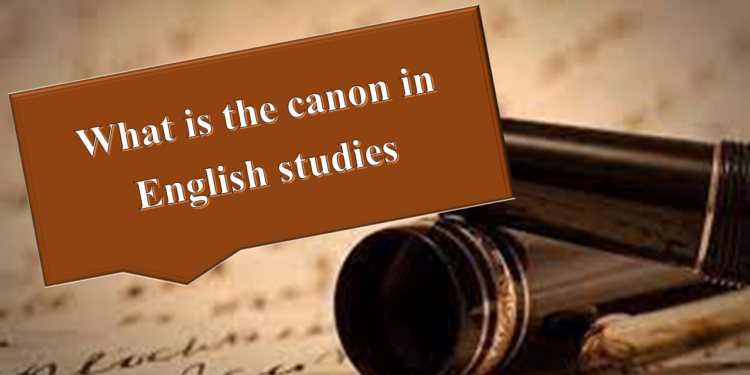What is the canon in English studies
What is the canon in English studies-What is a canon in English literature?,What is the concept of canon?,What is a canon in school?,What is canon in Indian English writing?,The concept of the canon in English studies encapsulates a carefully selected body of literary works deemed exemplary and indispensable within a given cultural or academic context. This curated collection, often regarded as timeless and authoritative, serves as a foundational framework for the study of English language and literature. Over centuries, the notion of a literary canon has evolved under the influence of cultural, historical, and societal factors, shaping and reshaping the landscape of English studies. While providing a structure for understanding the literary heritage of a language, the concept of the canon has also been a subject of considerable debate and critique.
The roots of the English literary canon trace back to the establishment of English literature as an academic discipline during the Renaissance in the 16th century. A renewed interest in classical Greek and Roman texts prompted scholars to seek a comparable tradition within English literature. Works by Chaucer and Spenser emerged as early contributors, laying the groundwork for what would later become the canon. The advent of the printing press played a pivotal role in disseminating these works, contributing significantly to the formation of a literary tradition.What is the canon in English studies
As centuries unfolded, the English literary canon expanded to encompass works from various periods and genres. The plays of William Shakespeare, the poetry of John Milton, and the novels of Jane Austen and Charles Dickens became cornerstones of the canon, reflecting the shifting tastes and values of different eras. The canon not only encapsulated works of literary merit but also functioned as a cultural repository, embodying the evolving identity of the English-speaking world.
The criteria guiding the inclusion of works in the canon have undergone continuous scrutiny. Initially, works were often selected based on their adherence to prevailing societal norms, religious values, or political ideologies. Over time, however, the criteria evolved to include considerations of aesthetic merit, innovation, and cultural impact. The literary canon thus became a dynamic entity, accommodating new voices and perspectives that mirrored the diversity of human experience.What is the canon in English studies
Despite its evolution, the canon has faced persistent challenges, particularly concerning its exclusivity and representation. Critics argue that the traditional canon is Eurocentric, male-centric, and neglectful of voices from marginalized communities. The exclusion of works by women, people of color, and writers from non-Western traditions has ignited debates about inherent biases within the canon. Scholars and activists advocate for a more inclusive approach that acknowledges the contributions of a broader spectrum of voices.
Also Read-
- What is the Ideology and Assumptions of the Canon
- The Crisis in English Studies
- What is the triumph of theory
One significant critique of the canon revolves around the concept of cultural hegemony. The works included in the canon are often associated with the cultural and political dominance of specific groups, perpetuating power imbalances and marginalizing alternative narratives. Scholars argue that a more diverse and inclusive canon would rectify historical injustices and offer a richer representation of human experiences.
The feminist literary criticism movement has played a pivotal role in challenging the gender bias within the canon. Figures such as Virginia Woolf and Simone de Beauvoir questioned the underrepresentation of women in literary history, emphasizing the importance of recognizing and celebrating the achievements of female authors. This critique prompted a reevaluation of existing canons and the emergence of alternative canons that prioritize gender inclusivity.What is the canon in English studies
Similarly, postcolonial scholars have scrutinized the colonial biases inherent in the canon. The dominance of Western literature in the traditional canon reflects the historical legacy of colonialism and the marginalization of voices from former colonies. Postcolonial literature, encompassing works by writers from Africa, Asia, the Caribbean, and other regions, challenges the Eurocentric perspective and seeks to decolonize the literary canon.
The inclusion of works by authors has also become a focal point in contemporary discussions about the canon. As societal attitudes toward gender and sexuality have evolved, there is a growing recognition of the importance of representing diverse sexual orientations and gender identities within the canon. Works exploring themes of queerness, identity, and non-normative experiences contribute to a more inclusive understanding of literature.
The advent of critical theory, including schools such as Marxism, structuralism, and poststructuralism, has further destabilized the traditional canon. These theoretical frameworks question the idea of an objective literary value and challenge the very notion of a stable and authoritative canon. Postmodern perspectives argue for the recognition of multiple canons, each shaped by specific cultural, social, and ideological contexts.
The digital age has also influenced the concept of the canon. The accessibility of online resources and the democratization of information have enabled a more diverse array of voices to gain recognition. Social media platforms, blogs, and digital archives provide spaces for marginalized voices to be heard and acknowledged, challenging the dominance of traditional canons.
In response to these critiques and changing perspectives, there has been a growing effort to expand the canon. Anthologies, scholarly publications, and university courses now increasingly incorporate works by women, writers of color, and LGBTQ+ authors. Efforts to diversify the canon aim not only to correct historical omissions but also to provide a more comprehensive and representative understanding of the human experience.
The question of the canon’s relevance in the 21st century remains a subject of ongoing debate. Some argue that the concept of a canon is inherently exclusionary and that the focus should shift toward a more fluid and inclusive understanding of literary value. Others contend that the canon, while imperfect, still serves as a valuable framework for organizing and studying literature, acknowledging its historical and cultural significance.













